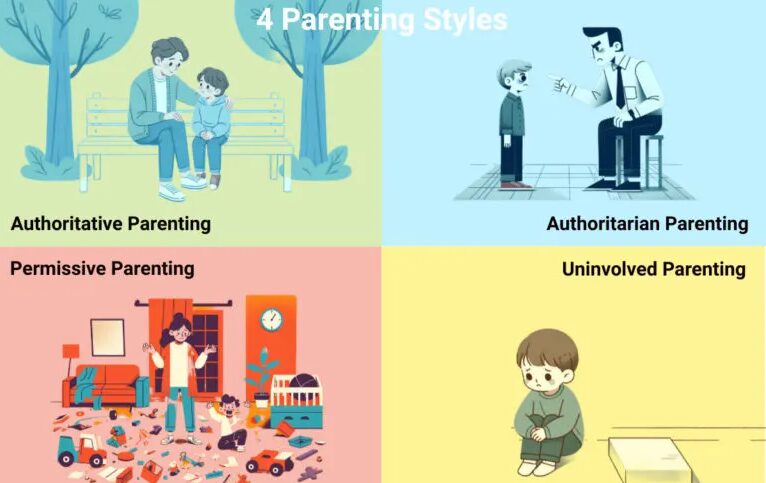Parenting is an intricate dance, a delicate balance between love and discipline, warmth and control. As parents, understanding the different parenting styles is crucial because how we interact with our children leaves an indelible mark on their emotional, physical, and behavioral development. The four primary parenting styles, according to the American Academy of Pediatrics and psychologists worldwide, are authoritative, authoritarian, permissive, and uninvolved.
Authoritative Parenting Style: Finding the Sweet Spot
Characterized by high responsiveness and demandingness, authoritative parenting strikes a balance between setting expectations and providing emotional support. In this style, parents nurture their children while maintaining clear boundaries. Recent studies suggest that children raised by authoritative parents exhibit positive psychological outcomes, better mental health, and academic excellence.

Authoritarian Parenting Style: The Cold Embrace of Strictness
Contrastingly, authoritarian parenting is marked by low responsiveness and high demandingness. These parents expect obedience without question, employing strict discipline and punishment. However, this approach can lead to negative outcomes, including mental health issues, lower self-esteem, and academic struggles.
Permissive Parenting Style: Balancing Warmth and Limits
Permissive parenting embraces warmth and responsiveness but leans towards leniency in setting boundaries. While it fosters emotional well-being, it can contribute to entitlement issues, academic challenges, and behavioral problems in children.
Uninvolved Parenting Style: The Silent Void
On the other end of the spectrum, uninvolved parenting is characterized by low responsiveness and demandingness. These parents, emotionally absent, make few demands and provide minimal support, leading to poor outcomes in a child’s emotional well-being, self-control, and overall development.
Understanding Parenting Styles
What Is a Parenting Style?
A parenting style is a set of child-rearing practices that significantly impact a child’s development and behavior. Psychologists widely use four parenting styles, namely authoritative, authoritarian, permissive, and uninvolved, to understand the dynamics between parenting methods and children’s outcomes.
Authoritative Parenting: A Blueprint for Success
Authoritative parenting, often termed the democratic style, combines warmth with high expectations. Studies indicate that children raised in this environment demonstrate positive psychological outcomes, better mental health, and academic excellence. The approach encourages independence while maintaining essential boundaries.

Authoritarian Parenting: The Pitfalls of Strictness
In contrast, authoritarian parenting, also known as the disciplinarian style, lacks warmth and relies on strict discipline. Research suggests that children raised in such an environment may face mental health challenges, lower self-esteem, and academic struggles.
Permissive Parenting: Navigating the Balance
Permissive parenting, marked by warmth and responsiveness, may lead to entitlement issues and academic challenges in children. However, research indicates potential benefits, such as increased physical activity and better overall health.
Uninvolved Parenting: The Consequences of Neglect
Uninvolved parenting, often termed neglectful parenting, results in poor emotional well-being, self-control, and overall development in children. The emotional void created by these parents can lead to various challenges in the child’s life.
Impact of Parenting Styles on Child Development
Parenting styles significantly influence child development across multiple dimensions, including emotional, cognitive, social, moral, cultural, physical, and mental aspects. Understanding these influences is crucial for creating a nurturing and supportive environment for a child’s growth.
Emotional Development: The Foundation of Attachment
Early bonds with parents shape a child’s ability to form relationships and manage emotions throughout life. Secure attachment, fostered by responsive parenting, provides a foundation for emotional regulation and resilience.
Cognitive Development: Shaping Academic Success
Providing a stimulating environment with educational resources positively impacts a child’s cognitive development and academic performance.
Social Development: Learning through Imitation
Children often mimic their parents’ social interactions, influencing relationship formation, cooperation, conflict resolution, and empathy.
Moral and Behavior Development: Guiding Right from Wrong
Parents serve as the primary source of moral and ethical guidance, shaping a child’s sense of right and wrong. Parenting and disciplining styles significantly impact a child’s moral development.
Cultural Development: Passing Down Traditions
Parents play a vital role in passing down cultural norms, traditions, and values, shaping a child’s cultural identity.
Physical and Mental Health: A Holistic Approach
Parents influence eating habits, attitudes toward physical activity, and overall health, affecting a child’s long-term physical and mental well-being.
Statistics on Parenting Styles
A 2009 joint study by Pennsylvania State University and the University of Chicago, utilizing data from Wave I of the Adolescent Health Longitudinal Survey, provides insights into the prevalence of parenting styles.
- Authoritative parenting: 46-49%
- Authoritarian parenting: 23-26%
- Permissive parenting: 18-20%
- Uninvolved parenting: 8-10%
The Best and Worst Parenting Styles
Best: Authoritative Parenting Style
Numerous studies, including a 1987 study by the Stanford Center for the Study of Youth Development, associate the authoritative parenting style with the best outcomes in children’s social competence, academic achievement, mental health, physical health, behavior, and adjustment outcomes.
Worst: Uninvolved Parenting Style
The uninvolved parenting style, closely followed by the authoritarian style, is linked to the poorest outcomes in emotional well-being, self-competence, social competence, empathy, academics, family relationships, nervousness, emotional instability, and hostility.
Common Parenting Styles and Their Trends
The 2016 National Survey on Drug Use and Health (NSDUH) revealed that the authoritative parenting style was the most common, with 53% of respondents identifying with this approach.
Strict vs. Lenient: Finding the Balance
Strictest Parenting Style: Authoritarian
Known for its high demands and low responsiveness, the authoritarian parenting style imposes rigid rules and high standards, allowing little open dialogue. While aiming for obedience, it can hinder a child’s self-esteem, social skills, and lead to behavioral problems.
Least Strict Parenting Style: Permissive
The permissive parenting style tends to be lenient, avoiding setting firm boundaries or enforcing rules. While creating a relaxed home environment, it can sometimes lead to poor self-discipline in children.
Gentle Parenting: A Child-Centered Approach
Gentle parenting emphasizes empathy, understanding, and emotional connection over punitive measures. Focusing on building a strong emotional bond, gentle parents guide their children with non-coercive methods, promoting independent decision-making and problem-solving.
Challenges in Modern Parenting
Parenting today is perceived as more challenging than in previous generations due to evolving child-rearing practices, increased pressure to be the “perfect parent,” and conflicting online advice. However, parenting has always been demanding, regardless of the era.
The Ever-Changing Phases of Parenthood
Some parents find certain stages, such as infancy, toddlerhood, pre-adolescence, or teenage years, more challenging than others. Challenges vary based on factors like the child’s temperament, parent’s expectations, the parent-child relationship, and external circumstances.
Nature vs. Nurture: The Ongoing Debate
The “nature vs. nurture” debate explores the contributions of genetic inheritance and environmental factors, including parenting styles, to child development. Twin studies reveal that the environment, including parenting, significantly shapes an individual’s behavior and personality traits.
In Conclusion
Understanding your parenting style is not about perfection but about creating the best environment for your child’s development. Authoritative parenting consistently emerges as the most positive approach, fostering emotional well-being, academic success, and overall positive outcomes. As you navigate the complexities of parenthood, let the guiding principles of authoritative parenting lead the way.





